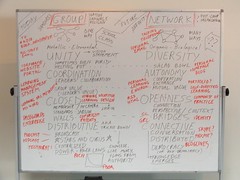Connectivism
In the 21st century it is almost impossible to be an expert on anything. There is so much information – and indeed knowledge – out there that we could only ever become experts in ever-diminishing content areas. Instead, we need to ourselves become, and train our students to likewise become, experts in connecting knowledge. This is where connectivism comes in:

Connectivism is the integration of principles explored by chaos, network, and complexity and self-organization theories. Learning is a process that occurs within nebulous environments of shifting core elements – not entirely under the control of the individual. Learning (defined as actionable knowledge) can reside outside of ourselves (within an organization or a database), is focused on connecting specialized information sets, and the connections that enable us to learn more are more important than our current state of knowing.
The theory is advocated most passionately by George Siemens via his connectivism.ca blog, in his article on connectivism at elearnspace, on the Learning Circuits blog, an article for the International Journal of Instructional Technology and Distance Learning and his excellent book (available via PDF or on his wiki), Knowing Knowledge.
Some notes:
- Bill Kerr is a critic of connectivism who has a wiki
- Wes Fryer has a post with some good links surrounding a presentation made by George Siemens
- The Experience Designer Network has a decent summary of connectivism
(There is a connectvism online conference running in February 2007 that should be worth checking out…)?

